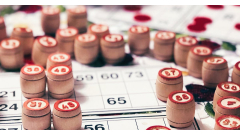Welcome to the world of Rummikub, a game that beautifully intertwines strategy, skill, and a bit of luck. Whether you're an experienced player or new to the game, exploring the various variations of Rummikub can add exciting twists to your gaming experience. From classic rules to house variations, the options are endless, making every game unique and entertaining.
In this guide, we’ll dive into the diverse ways to play Rummikub, ensuring you and your friends can enjoy the game to its fullest. Get ready to shuffle those colorful tiles and discover how changing up the rules can lead to a fresh and engaging gaming session!
Rummikub - The Original Rummy Tile Game by Pressman combines the classic gameplay of rummy with the interactive experience of tile-based strategy. Players use numbered tiles in a race to create sets and runs, applying their best strategic moves. Its simple rules make it accessible for players of all ages, while its depth allows for complex strategies to emerge. Suitable for family gatherings or friendly competitions, Rummikub guarantees endless fun and excitement, igniting a passion for gaming that transcends generations.
Basic Gameplay Variations
Rummikub - The Original Rummy Tile Game by Pressman offers several engaging gameplay variations that can enhance or modify the traditional experience. One popular alteration involves changing the tile drawing rules, which can significantly impact strategy. For instance, players might implement a rule where anyone drawing a tile must place it on the table face up for a round. This not only adds an element of transparency but may also allow players to strategize based on what tiles others are holding. Alternatively, a variation might include "wild" rounds where players can use a tile of their choice once per game, adding excitement and spontaneity to the gameplay.
Another critical modification lies within turn order changes. In some variations, players could be allowed to play out of turn if they can create a meld with the tiles laid on the table, encouraging quicker gameplay and strategic thinking. Additional winning conditions can also provide a fresh twist; rather than the traditional objective of emptying one’s tile rack, players might aim to create a specific combination or a greater number of melds within a certain time limit. This can add an enjoyable level of challenge and alter the pace of the game significantly.
- Implement face-up tile drawing for enhanced strategy.
- Introduce "wild" rounds for added excitement.
- Allow players to play out of turn under specific conditions.
- Modify winning conditions to focus on combinations or meld quantity.
Scoring Method Variations
Different scoring methods in Rummikub - The Original Rummy Tile Game by Pressman can significantly alter gameplay and strategic dynamics. The traditional scoring system assigns points based on the tiles left in opponents' hands once someone goes out. For example, each tile has a specific point value, with numbered tiles worth their face value and joker tiles valued at 30 points. This method emphasizes getting "out" quickly while managing your tile collection to minimize potential loss. Players often enjoy this method due to its straightforward approach, fostering competition as everyone keeps a close eye on each other's remaining tiles.
Alternatively, some players may prefer a cumulative scoring method where each round's scores are accumulated over multiple games. This encourages continued play and strategic depth, as players can shift focus from immediate gains to long-term positioning. For instance, if a player consistently scores the most points over several rounds, this method allows them to build a more comprehensive lead, which can be thrilling for those who enjoy seeing progress over time. Additionally, a point-based system can be introduced, where players earn bonus points for specific achievements like using all tiles in a particular combination. Each method creates unique scenarios that can enhance fun and competition.
- Traditional scoring is great for quick, competitive sessions.
- Cumulative scoring fosters long-term strategy and commitment.
- A point-based system adds rewarding challenges to standard gameplay.
Team Play Rules
Rummikub - The Original Rummy Tile Game by Pressman can be a thrilling experience when played in teams. To modify the game for team play, players should form alliances by pairing up, ideally with players of similar skill levels. Each team consists of two players sitting across from one another, which promotes interaction and strategy sharing. Before the game begins, it’s vital to establish some ground rules such as how turns will alternate between team members and how many tiles each team can draw during a turn. Each player draws the usual number of tiles at the beginning of the game, but partners can choose to share tiles from their personal sets during the game to create sets and runs, encouraging collaboration and strategic planning.
Communication is key in team play, and having a clear method of discussing strategy can be beneficial. Encourage teammates to use subtle cues or code words to signal their intentions or needs without revealing too much information to opposing teams. For example, a player might gesture to indicate they need a specific color or number tile, keeping their strategy somewhat concealed. Additionally, open dialogue about game progression and blocks can enhance team synergy. Trusting each other's instincts and sharing observations can lead to smarter plays. Consider these tips to enhance your team dynamics:
- Practice teamwork by pre-game discussions on strategies and tile management.
- Establish rules for how players can communicate without giving away too much to opponents.
- Encourage teammates to share tile information, so everyone is on the same page during play.
- Rotate who leads the strategy in each game, giving all players the chance to think critically.
Time-Limited Variations
Introducing time-limited variations to Rummikub - The Original Rummy Tile Game by Pressman can add a thrilling twist that amps up the excitement and urgency of each match. Instead of taking leisurely turns, players are required to complete their moves within a specified time frame. This variation demands not only quick thinking but also a strategic approach to tile play. To make the game even more engaging, consider implementing different timer setups, such as a one-minute timer per player's turn or an overall game timer of 30 minutes that counts down as players take their turns. Setting a timer creates an electrifying atmosphere, pushing players to act quickly and make split-second decisions.
Successfully adapting strategies for a faster-paced game requires an insightful approach. Players should focus on familiarizing themselves with their tiles before their turn and developing a mental list of potential plays. Quick scanning of the board for possible sets or runs can be beneficial when time is of the essence. Here are some additional tips for thriving under a time constraint:
- Prioritize plays that can utilize multiple tiles at once.
- Keep track of opponents’ possible moves with minimal distraction to strategize your subsequent turns.
- Practice a few mock rounds with the timer to get accustomed to the pacing.
- Be prepared to adjust your strategy based on the flow of the game, especially when you see opportunities arise.
Tile Trade Rules
In Rummikub - The Original Rummy Tile Game by Pressman, introducing tile trade rules can significantly enhance the interaction between players. This variation allows players to strategically exchange tiles at designated points in the game, typically after all players have completed their turns. Establishing clear guidelines for trading can lead to thrilling moments of collaboration or competition, depending on how players choose to engage with one another. The trading phase offers an opportunity for players to refine their tile sets, allowing them to form more advantageous groupings and melds than they might have had in their original hands.
Implementing tile trading starts by setting specific rounds within which trades can occur. For example, players may decide to permit trades after the first round of play or at the beginning of each player’s turn. Players should also agree on whether trades are limited to equal tile exchanges or if players can engage in negotiations involving multiple tiles on one side. The strategic implications of this rule can be vast; players might trade high-value tiles to position themselves for a potential win while keeping track of opponents' needs and preferences. Navigating this social and strategic landscape can lead to unexpected shifts in game dynamics.
- Encourages teamwork and alliances.
- Enhances strategic planning and decision-making.
- Can lead to unpredictably exciting shifts in the game.
Melding Styles
In the classic game of Rummikub - The Original Rummy Tile Game by Pressman, the art of melding can greatly influence the flow of the game. Players can adopt various melding styles that not only showcase their tile arrangements but also dictate their strategic approach. The two primary melding styles are open melds and hidden melds, each with its unique implications for gameplay.
Open melds involve players revealing their tiles and showcasing their combinations openly. This technique allows for more transparent gameplay, where opponents can see what you're working with, but it also invites counter-strategies. For instance, if a player lays down a set of three red 7s, others may rearrange their tiles with the intent to block future moves. Conversely, hidden melds keep your tiles secret, allowing for surprise moves later in the game. Players practicing this style often hold onto key tiles until they can make a significant play, like completing a large group or run at a crucial moment. This can create tension as other players jockey for position, unsure of what moves may unfold next.
- Open melds promote transparency and encourage competitive interaction.
- Hidden melds allow for strategic surprises, keeping adversaries guessing.
- Combining both styles can lead to dynamic gameplay shifts.
Custom House Rules
Creating custom house rules for Rummikub - The Original Rummy Tile Game by Pressman can be an exciting way to tailor your gameplay experience. These modifications can breathe new life into a classic game, allowing players to experiment with different strategies and engage in new styles of play. Begin by discussing with your fellow players about the types of changes they would like to see. Whether it is a tweak in scoring, a twist in gameplay, or additional components, getting everyone on board is crucial. This communication helps set expectations and ensures that all players feel invested in the modified rules.
When developing custom house rules, consider the following framework to ensure clarity and enjoyment:
- Identify the aspect of gameplay you want to change: Think about areas such as tile melding requirements, bonus points for specific combinations, or introducing new ways to play tiles.
- Draft the new rule: Write down the proposed rule clearly and concisely. This should include how it affects the objectives of the game and how it integrates with existing rules.
- Test the rule: Play a few rounds using the custom rule to see if it enhances the game experience. Be open to adjustment based on feedback.
- Have a rule review session: Before starting your next game, revisit the new rules to ensure everyone understands and agrees on how they will be implemented.
This framework not only enhances the fun of Rummikub but also fosters cooperation and creativity amongst players.
- Encourage creativity: Players can introduce challenges, tie-ins with current events, or themes that resonate with the group.
- Assign a keeper of the rules: Designate a player to monitor adherence to custom rules, which helps maintain structure.
- Rotate rules: Change up the house rules regularly to keep the game fresh and engaging for everyone.
Tournament Play Structure
Setting up a tournament for Rummikub - The Original Rummy Tile Game by Pressman can be an exciting way to bring players together. Start with designing a bracket format that suits your number of participants. Common formats include single elimination, double elimination, or round-robin. In single elimination, players compete until there is one winner, making this format fast-paced but leaving little room for multiple games. Double elimination allows players to have a second chance after one loss, providing a more forgiving structure. Round-robin play pits each participant against every other player, ensuring more games and showcasing overall skill.
Establish clear rules for each round. Players typically must reach a certain score within a set time limit to advance. It’s essential to determine how points are awarded per game, as this will impact final standings. Keeping a scoreboard visible to all participants promotes transparency. Using digital tools or spreadsheets can help in tracking results and calculating total scores efficiently. To enhance organization and manage player expectations, clarify tournament rules beforehand and ensure players understand the scoring system. Consider the following tips:
- Assign a tournament director to oversee the event.
- Encourage players to arrive early and warm up.
- Provide refreshments and comfortable seating to enhance the experience.
Learning Variants for Beginners
Rummikub - The Original Rummy Tile Game by Pressman can be an exhilarating experience, but mastering the traditional rules can sometimes overwhelm new players. To make the game more approachable, you can simplify the gameplay with a few beginner-friendly variants. One effective method is to play a shorter version of the game. Instead of aiming to empty your entire rack, new players can focus on playing just a set number of tiles (like five) each turn. This eases the pressure on beginners and allows them to gain confidence and understanding of the basic mechanics.
Another variant that can be adopted is the *no joker* rule for the initial rounds. This means beginners should only play with numbered tiles, creating a more straightforward matching process. Once players grasp this, introducing jokers as wild tiles can add excitement without overwhelming complexity. Additionally, to foster a more cooperative learning atmosphere, players can have open discussions before turns regarding possible moves. Understanding potential combinations together as a group can enhance comprehension and strategy development.
- Track tile placements openly to increase familiarity with the tile sets.
- Encourage players to explain their moves during the game.
- Modify the scoring system by only counting tiles left on the rack for the first few games.
Strategic Variations
Rummikub - The Original Rummy Tile Game by Pressman offers a versatile platform for implementing strategic variations that can significantly alter gameplay. One engaging variation is the "Meld Limitation" rule, where players are only allowed to begin their melds with sets that contain pairs or triples of the same number in different colors. This rule forces players to focus on collecting specific tiles and rethink their strategies regarding tile placements. The typical gameplay encourages broader meld creations, while this variation narrows the focus, making players adapt to the limitations imposed on their plays. As a result, players may find themselves prioritizing certain tiles over others, potentially leading to tense moments when critical tiles elude their grasp.
Another intriguing variation is the "Joker Restriction" method, which places limits on the use of joker tiles. For example, players may be restricted to using jokers only in sets that consist of a run of numbers rather than allowing them in any meld type. This encourages players to think creatively about how to utilize their existing tiles while ensuring they don't overly rely on the joker for easier plays. Consequently, strategic evaluation of tile placements becomes vital, as players must work harder to achieve their meld objectives without the joker's assistance. Players are often required to weigh their options more thoroughly, assessing the risk of holding onto certain tiles.
- Mixing these strategic variations can lead to thrilling and unique dynamics in each game session.
- Consider forming house rules that combine several variations to keep gameplay fresh and challenging.
Why We Chose This Product
Choosing to explore the different variations of Rummikub for this guide stems from its rich potential for creativity and engagement. With each variation, players can experience unique challenges and strategies that make the game ever-evolving. Understanding these alternatives not only enhances your gameplay but also fosters a sense of camaraderie among players.
- Fosters creativity with rule adaptations
- Encourages strategic thinking and flexibility
- Enhances social interaction through diverse play styles
By highlighting these variations, we hope to inspire you to gather your family and friends for memorable game nights filled with laughter, competition, and connection. Rummikub is more than just a game; it's an experience waiting to unfold with every twist in the rules!
Rummikub - The Original Rummy Tile Game by Pressman combines the classic gameplay of rummy with the interactive experience of tile-based strategy. Players use numbered tiles in a race to create sets and runs, applying their best strategic moves. Its simple rules make it accessible for players of all ages, while its depth allows for complex strategies to emerge. Suitable for family gatherings or friendly competitions, Rummikub guarantees endless fun and excitement, igniting a passion for gaming that transcends generations.










